Mission of Life
In the class, I learned that everyone has a mission of life. I learned that finding the missin of life is not directly related to age, either she/he is still at teenage period, on mid of 30s, or even older. Usually it starts with a “worry” or “confusion” over one’s life direction, then it will lead to further worrisome and question that will encourage one to seek the answer of “Why Allah does create him/her in the earth” (Tim Matrikulasi IIP, 2019, p. 3). What make it different from one to another is how fast one finds the answer, to what extend she/he is moving to find the mission of life and then take actions accordingly.
Furthermore, as a Muslim, we actually believe that Allah creates humankind with certain mission and purpose. There are some Quranic verses relate to human’s life mission (citation web & quran.com) :
- To worship Allah
وَمَا خَلَقْتُ الْجِنَّ وَالإنْسَ إِلا لِيَعْبُدُونِ
“And I did not create the jinn and mankind except to worship Me.” (QS. Adh-Dhariat: 56)
Allah creates us to worship Allah. It is the way of obidience and also gratitude towards all the mercy bestowed by Allah.
- To be the Representative of Allah (khalifah) in the earth
وَإِذْ قَالَ رَبُّكَ لِلْمَلَائِكَةِ إِنِّي جَاعِلٌ فِي الْأَرْضِ خَلِيفَةً ۖ قَالُوا أَتَجْعَلُ فِيهَا مَن يُفْسِدُ فِيهَا وَيَسْفِكُ الدِّمَاءَ وَنَحْنُ نُسَبِّحُ بِحَمْدِكَ وَنُقَدِّسُ لَكَ ۖ قَالَ إِنِّي أَعْلَمُ مَا لَا تَعْلَمُونَ – 2:30
وَعَلَّمَ آدَمَ الْأَسْمَاءَ كُلَّهَا ثُمَّ عَرَضَهُمْ عَلَى الْمَلَائِكَةِ فَقَالَ أَنبِئُونِي بِأَسْمَاءِ هَٰؤُلَاءِ إِن كُنتُمْ صَادِقِينَ – 2:31
قَالُوا سُبْحَانَكَ لَا عِلْمَ لَنَا إِلَّا مَا عَلَّمْتَنَا ۖ إِنَّكَ أَنتَ الْعَلِيمُ الْحَكِيمُ – 2:32
قَالَ يَا آدَمُ أَنبِئْهُم بِأَسْمَائِهِمْ ۖ فَلَمَّا أَنبَأَهُم بِأَسْمَائِهِمْ قَالَ أَلَمْ أَقُل لَّكُمْ إِنِّي أَعْلَمُ غَيْبَ السَّمَاوَاتِ وَالْأَرْضِ وَأَعْلَمُ مَا تُبْدُونَ وَمَا كُنتُمْ تَكْتُمُونَ – 2:33
“And [mention, O Muhammad], when your Lord said to the angels, “Indeed, I will make upon the earth a successive authority.” They said, “Will You place upon it one who causes corruption therein and sheds blood, while we declare Your praise and sanctify You?” Allah said, “Indeed, I know that which you do not know (30). And He taught Adam the names – all of them. Then He showed them to the angels and said, “Inform Me of the names of these, if you are truthful (31). They said, “Exalted are You; we have no knowledge except what You have taught us. Indeed, it is You who is the Knowing, the Wise.” (32) He said, “O Adam, inform them of their names.” And when he had informed them of their names, He said, “Did I not tell you that I know the unseen [aspects] of the heavens and the earth? And I know what you reveal and what you have concealed.”(33) [QS. Al-Baqarah : 30-33]
يَا دَاوُودُ إِنَّا جَعَلْنَاكَ خَلِيفَةً فِي الْأَرْضِ فَاحْكُم بَيْنَ النَّاسِ بِالْحَقِّ وَلَا تَتَّبِعِ الْهَوَىٰ فَيُضِلَّكَ عَن سَبِيلِ اللَّهِ ۚ إِنَّ الَّذِينَ يَضِلُّونَ عَن سَبِيلِ اللَّهِ لَهُمْ عَذَابٌ شَدِيدٌ بِمَا نَسُوا يَوْمَ الْحِسَابِ – 38:26
[We said], “O Daud, indeed We have made you a successor upon the earth, so judge between the people in truth and do not follow [your own] desire, as it will lead you astray from the way of Allah .” Indeed, those who go astray from the way of Allah will have a severe punishment for having forgotten the Day of Account.
These verses mentioned about “khalifah” or the representative of Allah in the earth, in which Allah appointed human to be. There are lots of tafsir of these verses, however to make it short I just want to highlight only few points:
– Allah appoints human to be khalifah means “to be representative of Allah to do Allah’s decision and spread the diin.” (Mu’thi, 2012).
– According to Quran Al-Baqarah, when Allah wanted to appoint a representative of Himself, the angels understood that this position is very high. This appointment was not exclusive to Adam (a.s.) because Allah also mention the same word of khalifah for Daud (a.s.). It means that Allah wanted to “make a new species on earth and among them some will be good and some will be bad and amongst those good human beings will be some at this high position (caliphate) and they will be rulers on earth or the natural universe” (Shomali, 1996).
– Furthermore, Shomali (1996) mentioned that appointed to be the representative of Allah means that human beings has two kind of guardianship. First, guardianship over the universe and creatures or called ‘generative guardianship.’; in which “one can do everything in this world such as curing the sick”. Second, guardianship in judgement and making laws or called ‘legislative guardianship’; in which ordinary people or even a mujtahid can never make laws but should always “refer to Islamic sources and understand practical laws”. The Islamic parliament and judge should apply general laws to different situations but only allow to “fill empty places in the legislative universive which is delegated to them by Allah (to the people or to the legal authority)”.
– Why Allah appoints human beings because human has different characteristics compared to other creatures in the heaven, hell, and earth. Allah equips every mankind with intellegence/mind and nafs (emotion) that will make them thinking and other abilities. Therefore, in the QS Al-Baqarah Allah mentions that He teaches Adam (a.s.) many names; it refers to knowledge or ilm that not just merely name of things.
It is inline with Faruq Ahmad Dasuqi’s opinion (1997 in Mu’thi, 2012) that there are 5 elements of khalifah:
1. The party who gives the authority: Alloh
2. The party who receives the authority: all mankind.
3. The tasks followed: keep the earth prosporeous, optimise everything in the world to be useful for mankind, all creatures, and universe as what it should naturally be.
4. Requirement of the caliphate: Islamic teachings and laws. To be a khalifah in this world means one should learn Islam deeper, so that everything they do will be based on Islamic teachings, values, and laws.
5. Timeframe or duration of the caliphate: since the moment of creation of Adam (a.s.) until the end of the world. All these actions to play the role as caliphate in this world will be judged and accounted for in the hereafter.
In sum, there is no such thing called meaningless and worthless life for every human being. Every person is born to have a divine mission in this world: to develop a CIVILISATION by doing best actions to implement and spread Islam. To do it, every person should understand their own potentials and bring about their best to do the job as khalifah. Ultimately, every action that human does in the world will be recorded and rewarded in the hereafter. Allah The All-Knowing.
Productivity Leads to Finding the Mission of Life
In IIP, we learn that productivity will lead to ways to find our mission of life. Productivity refers to an (series of) activity that make us happy to do and give impact either for him/herself and/or others. Therefore everyone has different mission, based on their ability and interest. Being productive means “playing one’s role wholeheartedly” (bersungguh-sungguh menjalankan peran), therefore “we need to do anything we can and love immediately, with passion, and without overthinking” (Tim Matrikulasi IIP, 2019). Or as old saying “do with passion or nothing”.
Furthermore, Ibu Septi on her lecture video (Padepokan Margosari, 2016) mentioned that no one knows what their real-life mission except attempting to always move and become productive. There are 3 simplest indicators to identify whether our productivity happens to be our mission of life:
-
Our eyes spark joy when we are doing the activities
-
We have full of enthusiasm and energy that lead us into more curiosity to seek more relevant knowledge so that we become more productive
-
Our immunity increases due to the happiness emerged from the activities we do
Besides, there are two important aspects to be considered if one wants to be productive according to the articles of Shoaib Ahmed Malik (2011) and Abu Productive : pure intentions and the basics (knowledge, patience, time), as well as the three elements of productivity (knowledge, action, and consistency).
First, the pure intentions.
As what I wrote in NHW #6 that intentions is the most important action to take first, since it is mentioned in the hadith. The intention is the seed for sprouting every action, thought and feeling we act upon (Malik, 2011). To be the expert of our own intentions, Malik (2011) brought us to re-thingking over the QS Al-‘Asr: 1-3 that contains three basic ingridients that should be internalise within us, especially to face any difficulties:
- Knowledge – we need to learn about Islam, the good characters of the Prophet Muhammad PBUH, etc. By learning all these knowledge, we will do everything based on what we learn. “We can only grow stronger through what we learn by which this knowledge one can develop and become a better person, and most importantly it is a means through which we can get closer to Allah” (Malik, 2011).
- Patience – the pillar of our faith. Malik (2011) reminded us that we need to “consistently remind ourselves of Judgement Day and that our patience is the catalyst that can ease our transition from this life to the eternal one, so that the more we can control our desires and struggles in this life, the easier and better our situation will be in the hereafter insha’Allah Ta’ala”.
- Time – Malik (2011) suggested that “every second is another opportunity that we can use to make sure our intentions are for the right cause; so we need to make sure we use every second wisely and effectively”.
Conclusion: knowledge is the key, time is the opportunity and patience is the effort needed to reach our goal. By combining these three we can then set the gears in motion to start mastering our intentions, which can then help us lead a more productive lifestyle, Islamically. (Malik, 2011)
Second, the productivity triangle
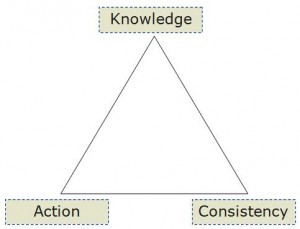
Abu Productive (2010) highlighted the importance of three elements if one want to be productive: Knowledge, Action, and Consistency. Similar to what Malik’s ideas above, this ideas give more practical things to be productive, meanwhile Malik provide more philosophical basics.
- Knowledge is the key and core of everyhing we want to do. We need to understand what we need to do, how to do it, and maybe why we do it. It will benefit everyone who has problem with procrasination, because “they do not know how to do it and they are worried to approach this learning curve out of fear that they may never understand how to do it” (Productive, 2010). Therefore, effort to seek the knowledge becomes the key in which there are many ways to seek it. As long as we enthusiastically seek ways to find it, insya’ Allah we’ll find it. I already mentioned particularly about learning style on my NHW #5.Ultimately, we also need to make a du’a for every efforts to seek knowledges. Because all the knowledges is owned by Allah. If we gain the knowledge, it is the blessing and mercy He bestows to us.
- Action as the implementation or further step after we gain the knowledge. We need to understand that: “in one hand we need to remember that we must take action upon the knowledge that we learnt in order to be productive, but we have to understand here that Action/Ability or Skill comes from Allah (Subhanahu Wa Ta’ala) first and foremost, since without his permission you can’t do anything” (Productive, 2010).
- Being consistent is the last important element. Consistency will define ourselves whether being productive or procrasinate, whether we are powerful or just moody. Many people find hard to be consistent, meanwhile to be consistent is one of the suggested traits by the Prophet Muhammad PBUH. So, here are few tips to follow (Productive, 2010):
(a) Start with small actions and grow slow. It is better to do small tasks or actions but do it consistently. As what Prophet Muhammad (Peace be upon him) said that the most beloved actions to Allah (Subhanahu Wa Ta’ala) are those that are consistent even if they are small. [Hadith]
(b) Break all the necessary actions down into some fewer/simpler steps, or if necessary we can delegate the task. It is accordance as we learn in the IIP previous week.
(c) Keep the intentions pure and sincere as mentioned above
(d) Ask Allah for help. We need to, most importantly, “ask Him to be consistent in our Deen and religion, so that you’re constantly worshipping Him to the best of our ability and improving ourselves and those around us” (Productive, 2010).
Conclusion:
Becoming a productive person means we do the mission of life as mentioned above. And for the further practical aspects of productivity is very personal thing in which everyone may have different activities and interest. Once we take special interest into something, we will be eager to seek more knowledge about it then take relevant actions and we need to be consistent about it.
Could it be the life mission of mine?
As mentioned above, a mission of life has close and causal relations with productivity. There are 3 main steps I should follow that happened to be my homework for this week:
- Choose one of the activities as written in the quadrant of NHW #7
- Set a BE-DO-HAVE list in becoming what I want to be with the following details: (a) BE – refers to mentality or traits that should have; (b) DO – refers to what I should do; (c) HAVE – refers to what I will do if I have what I hope for
- Set a series of planning based on time dimension: (a) lifetime purpose – what I want to achieve and chase for in life; (b) strategic plan – what I want to achieve in 5-10 years; (c) new year resolution – what I want to achieve in a year
I started the assignment with a reflective thought. I re-read all my NHW from #1 until #7. I read again my diary and posts in social media. I want to re-check and ensure what I really like, and what I am really like. I understood that I was in bad condition when I had my mental health problem facing my days in London and aftermath. Luckily, Alhamdulillaah, I started regaining my life the past year and it was boosted once I joined IIP until now.
As what Ibu Septi said in the lecture, that no one really knows their mission of life, but we could find which most activities that lead us to be a productive Mom and having a meaningful life that can be considered as mission of life (Citation). The key is: having a faith within ourselves.
So, I started with my life map and the quadrant.
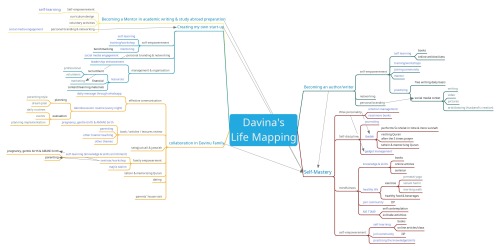
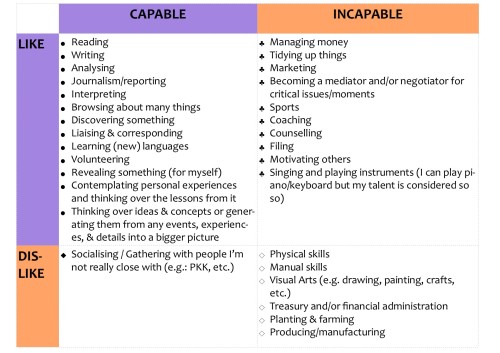
As we can see in the quadrant that I have many things I consider as my abilities, meanwhile in the life map I choose specific interest to develop: writing. The map contains the Be-Do-Have elements and also all the plannings. They can be broken down into more detailed figure and table to make it clear. Therefore I choose “becoming an author/writer” for this assignment as follow:
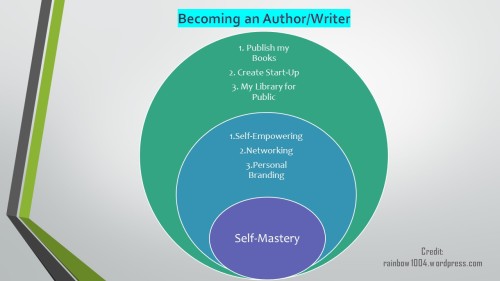
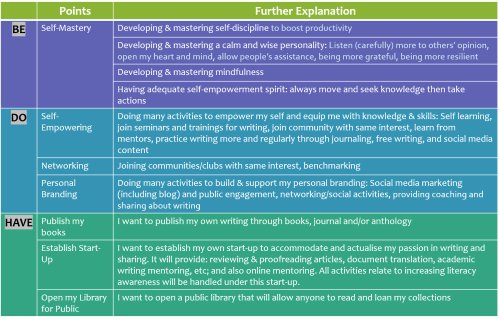
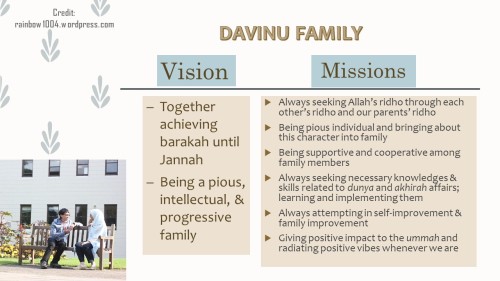
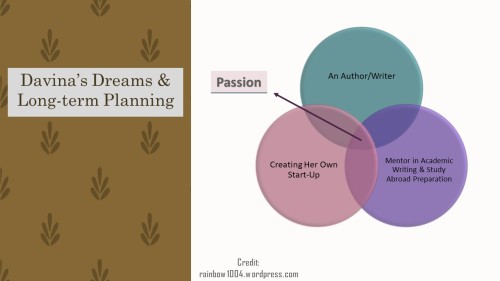
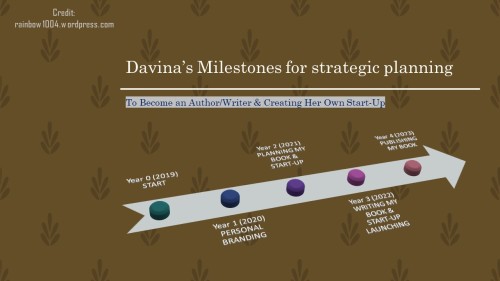
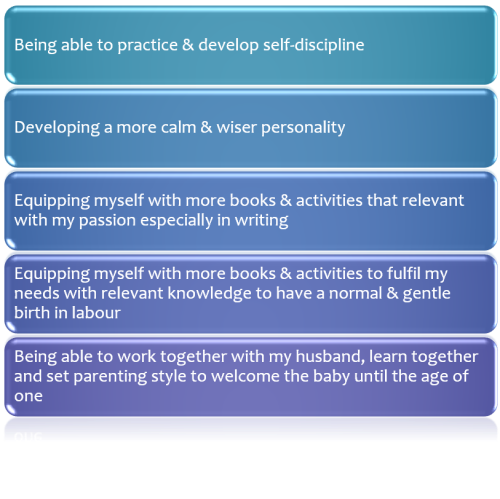
REFERENCES:
Hardi P., W. (2015) 2 Tujuan Penciptaan Manusia. Availabe at: https://muslimah.or.id/7109-2-tujuan-penciptaan-manusia.html (accessed: 4 April 2019)
Malik, S.A. (2011) Refine your Intentions for Productivity. Available at: http://productivemuslim.com/refine-your-intentions-for-productivity/#ixzz2i2WLfFG8 (Acccessed: 18 October 2013)
Mu’thi, W. (2012) Penciptaan Manusia sebagai Khalifah Allah di Muka Bumi. Available at: https://psq.or.id/artikel/penciptaan-manusia-sebagai-khalifah-allah-di-muka-bumi/ (accessed: 4 April 2019)
Padepokan Margosari (20176) [Karya Padepokan Margosari] Matrikulasi IIP Sesi 8 – Menemukan Misi Spesifik Hidup. Available at: https://youtu.be/8fUoKUdVIio (Accessed: 20 March 2019)
Productive, Abu (2010) The Productivity Triangle. Available at: http://productivemuslim.com/the-productivity-triangle/#ixzz2i2N3h6UQ (Accessed: 18 October 2013)
Shomali, M.A. (1996). ‘The Representative of Allah on Earth’, in Shomali,M.A. Self-Knowledge. Tehran: International Publishing Co, pp. 88-92. Available at: https://www.al-islam.org/self-knowledge-mohammad-ali-shomali/representative-allah-earth (accessed: 5 April 2019)
Tim Matrikulasi IIP (2019) ‘Misi Hidup dan Produktifitas’, Matrikulasi Ibu Profesional Sesi #8. Institut Ibu Profesional. Unpublished.
Tuasikal, M.A. (2009) Untuk Apa Kita Diciptakan Di Dunia Ini? Available at: https://rumaysho.com/342-untuk-apa-kita-diciptakan-di-dunia-ini.html (accessed: 4 April 2019)
NOTE:
This is my work to submit as the assignment in Matriculation level of IIP in week 8, namely Nice Homework (NHW) #8. The theme for the 8th week was “Misi Spesifik Hidup dan Produktifitas” or Specific Mission of Life and Productivity
If you wish to adopt or use my work, use proper citation style on your work. And feel free to send your appreciation, comments, or discussions on the comments section below.
Jika ingin mendapatkan versi bahsa Indonesia, silahkan meninggalkan komentar atau hubungi saya langsung melalui email davinazalia@gmail.com
Silahkan menuliskan aliran rasa, komentar, atau diskusi silahkan tulis di kolom komentar.. 🙂
